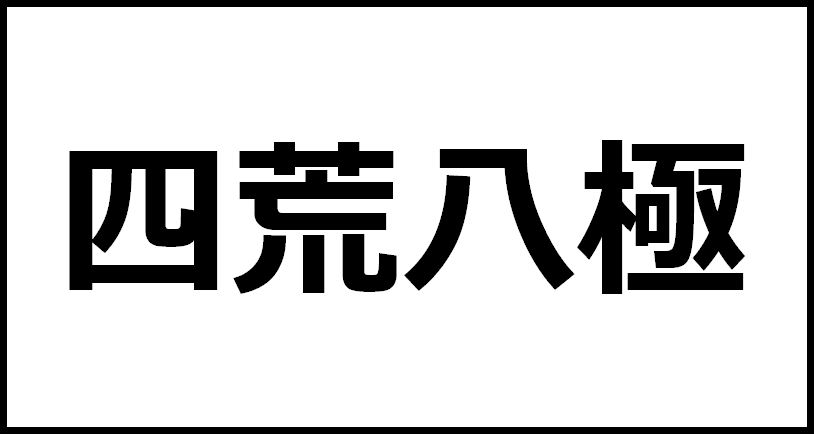四荒八極について。四字熟語の四荒八極の読み方や意味、英語や外国語での意味をまとめました。
四荒八極について
四荒八極の読み方・意味
| 四字熟語 | 四荒八極 |
| 読み方 | しこうはっきょく |
| カタカナ読み | シコウハッキョク |
| ローマ字読み | shikohakkyoku |
| 読みの文字数 | 8文字読みの四字熟語 |
| 頭文字 | 「し」から始まる四字熟語 |
| 構成する文字 | ・八 ・四 ・極 ・荒 |
| 意味 | 世界の隅々まで。世界のあらゆる場所をさす。「四荒」は四方の果てのえびすの住む地北方の觚竹、南方の北戸、西方の西王母、東方の日下。「八極」は八方の遠方の地、八方の地の果ての所をいう。 |
四荒八極の意味(外国語)
四荒八極の外国語での意味をまとめました。
| 英語 | to every corner of the world. point to any place in the world. The “four wilds” are the northern part of Ebisu, where Ebisu lives, Kitato in the south, Saioubo in the west, and Kusaka in the east. “Hakkyoku” refers to the distant land of eight directions, the end of the land of eight directions. |
| スペイン語 | a todos los rincones del mundo. apuntar a cualquier lugar del mundo. Los “cuatro salvajes” son la parte norte de Ebisu, donde vive Ebisu, Kitato en el sur, Saioubo en el oeste y Kusaka en el este. “Hakkyoku” se refiere a la tierra distante de las ocho direcciones, el final de la tierra de las ocho direcciones. |
| イタリア語 | in ogni angolo del mondo. indicare qualsiasi luogo del mondo. Le “quattro terre selvagge” sono la parte settentrionale di Ebisu, dove vive Ebisu, Kitato a sud, Saioubo a ovest e Kusaka a est. “Hakkyoku” si riferisce alla lontana terra delle otto direzioni, la fine della terra delle otto direzioni. |
| ポルトガル語 | para todos os cantos do mundo. apontar para qualquer lugar do mundo. Os “quatro selvagens” são a parte norte de Ebisu, onde Ebisu vive, Kitato no sul, Saioubo no oeste e Kusaka no leste. “Hakkyoku” refere-se à distante terra das oito direções, o fim da terra das oito direções. |
| フランス語 | in ogni angolo del mondo. indicare qualsiasi luogo del mondo. Le “quattro terre selvagge” sono la parte settentrionale di Ebisu, dove vive Ebisu, Kitato a sud, Saioubo a ovest e Kusaka a est. “Hakkyoku” si riferisce alla lontana terra delle otto direzioni, la fine della terra delle otto direzioni. |
| 中国語 | 到世界的每一个角落。 指向世界上的任何地方。 “四野”是惠比寿居住的惠比寿北部、南部的北户、西部的斋王坊、东部的日坂。 “八极”是指八方的远方,八方的尽头。 |
| 韓国語 | 세계의 구석구석까지. 세계의 모든 장소를 말한다. 「사황」은 사방의 끝의 에비스가 사는 땅북쪽의 왕죽, 남방의 북도, 서방의 서왕모, 동방의 히하. 「팔극」은 팔방의 먼 땅, 팔방의 땅의 끝을 말한다. |


